Miscellaneous Transfer Pricing Provisions
OBJECTIVE OF INTRODUCTION OF SECTION 94A
Discourage assessees from entering into transactions with persons located in countries or territories which do not exchange tax information with India.
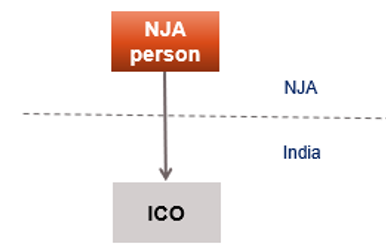
NOTIFIED JURISDICTIONAL AREA – SECTION 94A
The Central Government may notify any country or territory outside India as a Notified Jurisdictional Area (NJA), if such country or territory does not share tax information with India.
Till now India has only notified Cyprus as notified jurisdictional area on November 01, 2013 for not sharing tax information with India (vide notification no. SO3307(E) dated November 01, 2013).
However, Cyprus was removed from the list of NJA on December 14, 2016 (vide notification no. SO4033 (E) dated December 14, 2016)
APPLICABILITY OF TP PROVISIONS ON TRANSACTIONS ENTERED WITH PERSONS LOCATED IN nja – SECTION 94A
If the assessee enters into a transaction where one of the parties to the transaction is a person located in a NJA then :
- all parties to the transaction would be deemed as AE;
- Such transaction would be deemed to be international transaction as per section 92B; and
- All the provisions of transfer pricing would be attracted in case of such transactions.
NOTE : –
- In the above case the benefit of permissible variation between the ALP price and Transfer price (as per second proviso to section 92C(2)) would not be available.
- Transaction may be nature of
- purchase, sale or lease of tangible or intangible property or
- provision of service or
- lending or borrowing money or
- any other transaction having a bearing on the profits, income, losses or assets of the assessee including a mutual agreement or arrangement for allocation of common expenditure.
PERSON LOCATED IN NJA – SECTION 94A
Person located in a NJA shall include
- a person who is a resident of the NJA; or
- a person, not being an individual, which is established in the NJA; or
- Permanent establishment of any person (other than person resident/ established in NJA) in the NJA.
Note:-
As per section 92F(iiia) Permanent establishment includes a fixed place of business through which business of the enterprise is wholly or partly carried on.
Consequences of declaration of any country as NJA – section 94A
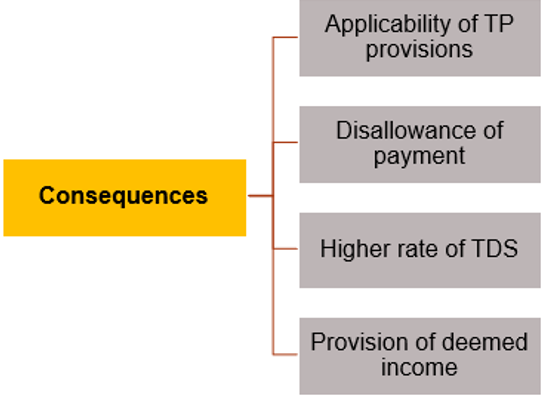
NOTE : –
- Consequences of declaration of any country as NJA :
- TP provision would apply where one of the parties in transaction located in NJA.
- Payment made to person located in NJA would be disallowed (unless certain conditions are satisfied).
- Payment made to person located in NJA would attract higher rate of TDS.
- Any receipt from the person located in NJA would be deemed as income of recipient (unless certain conditions are satisfied).
DISALLOWANCE OF PAYMENT MADE TO PERSON LOCATED IN NJA – SECTION 94A
- Any payment made to financial institution shall be disallowed unless the assessee authorizes the CBDT or any other income tax authority acting on CBDT behalf to seek information of assessee from such financial institution.
- Any other expenditure or allowance, including depreciation, arising from the transaction with a person located in a NJA shall be unless the assessee maintains or furnishes prescribed information.
TDS APPLICABILITY ON PAYMENT MADE TO PERSON LOCATED IN NJA – SECTION 94A
Where payment is made to a person located in NJA then TDS shall be deducted at the highest of the following rates :
- rates specified in the relevant provision of the Income-tax Act, 1961; or
- rate or rates in force; or
- 30%.
Note :-
As per section 2(37A) rate or rates in force means rate specified in the –
- Income-Tax Act, 1961 ; or
- The Finance Act ; or
- Tax treaty (DTAA),
whichever is applicable
RECEIPT FROM PERSONS LOCATED IN NJA DEEMED TO BE INCOME OF RECEIPINT/BENEFICIAL OWNER – SECTION 94A
Where assessee has received or credited any sum from a person located in a NJA then it shall be deemed as income of the assessee/beneficial owner for that PY. However, such deeming provision would not apply where the assessee explains the source of such income in the hands of payer or beneficial owner.
RECEIPT FROM PERSONS LOCATED IN NJA DEEMED TO BE INCOME OF RECEIPINT- SECTION 94A
EXAMPLE : –
CBDT has notified Country X as NJA u/s 94A on April 01, 2017 due to lack of effective exchange of tax information with India. On August 01, 2017, Mr. A has received a loan of Rs. 10,00,000 from his Uncle Mr. C who is resident of Country X. Since Mr. A has received money from a person located in NJA, such money would be deemed as income of Mr. A if he fails to explain the source of income in the hands of his Uncle Mr. C
CONSEQUENCES OF DECLARATION OF ANY COUNTRY AS NJA – SECTION 94A
EXAMPLE 1 : –
ICO (Indian Co.) sells product X to FCO located in NJA @ Rs. 3,00,000. It sells same quality of product X to FCO1 @ Rs. 3,50,000. Discuss the tax implication u/s 94A ?
SOLUTION : –
If the assessee enters into a transaction where one of the parties to the transaction is a person located in NJA then
- all parties to the transaction would be deemed as AE;
- Such transaction would be deemed to be international transaction as per section 92B; and
- All the provisions of transfer pricing would be attracted in case of such transactions.
Since FCO is located in NJA, ICO and FCO would be deemed as AE and transaction of sale of product to FCO would be deemed as international transaction. Sale of product X @ Rs. 3,50,000 would be comparable uncontrolled transaction, thus it would be considered to arrive at income arising from international transaction.
EXAMPLE 2 : –
ICO received technical services from FCO located in NJA @ Rs. 3,00,000. The rate of TDS on Fees for technical services u/s 115A is 10%. Discuss the tax implication u/s 94A ?
SOLUTION : – As per the provision of section 94A the rate of TDS in respect of any payment made to a person located in the NJA, on which tax is deductible at source, will be the higher of the following rates –
- rates specified in the relevant provision of the Income-tax Act, 1961; or
- rate or rates in force; or
- 30%.
The amount of TDS is Rs. 30,000 (10%) as per normal provision of the Income Tax Act, 1961. However, the higher rate of TDS of 30% would be attracted in this case as the payee (FCO) is located in NJA. Accordingly the amount of TDS u/s section 94A would be Rs. 90,000 (30%).
INTRODUCTION OF THIN CAPITALIZATION NORMS
Capital structure of a company comprises of : –
- Debt – Interest on which may be tax deductible; and
- Equity – Dividend on equity are not deductible for tax purpose.
If the ratio of Debt to Equity is high, the company is said to be highly leveraged or thinly capitalized.
To claim tax deduction on interest and thereby reduce their tax liabilities, foreign parent companies generally thinly capitalized their Indian subsidiaries , in absence of any thin capitalization norms in India.


EXAMPLE : –
| Particulars | ICO | FCO |
| Revenue | 1000 | 100 |
| Interest expense | 100 | – |
| PBT | 900 | |
| Tax rate | 30% | 5% |
| Tax | 270 | 5 |
| Tax saving due to interest | 30 | – |
| Net tax benefit to AEs | 25 (30 – 5) | |
ICO has saved tax of Rs. 30 on payment of interest to FCO. On the other hands FCO has paid tax of Rs. 5 on interest income received from ICO. Thus the overall tax benefit to MNC group is Rs. 25 (30-5).
INSERTION OF SECTION 94B – LIMITATION ON INTEREST DEDUCTION
“Base Erosion And Profit Shifting (BEPS) Action Plan 4” of OECD deals with Shifting of Profit by way of excessive interest deduction.
The Finance Act, 2017 has inserted Section 94B to restrict the excessive interest deduction in line with recommendation of OECD BEPS Action Plan 4
DISALLOWANCE OF INTEREST DEDUCTION – SECTION 94B
Interest paid/ payable by assessee to its AE shall not be deductible in computation of income under the head “profit and gains of business or profession” to the extent that it arises from excess interest.
NOTE : –
- Excess Interest shall means the lower of the following : –
- Total Interest paid or payable (i.e. total interest paid/ payable to AE and non-AE) in excess of 30% of its earning before interest, taxes, depreciation, and amortization (EBITDA) of the borrower in the PY ; or
- Interest paid/ payable to AE for that previous year
APPLICABILITY OF SECTION 94B
Section 94B provision are applicable where the borrower is an Indian company, or a Permanent Establishment of a foreign company in India, who incurs any expenditure by way of interest or similar nature in respect of any form of debt issued by a non-resident AE of the borrower. However, provision of section 94B shall not be applicable to an Indian company or permanent establishment of a foreign company which is engaged in the business of banking or Insurance
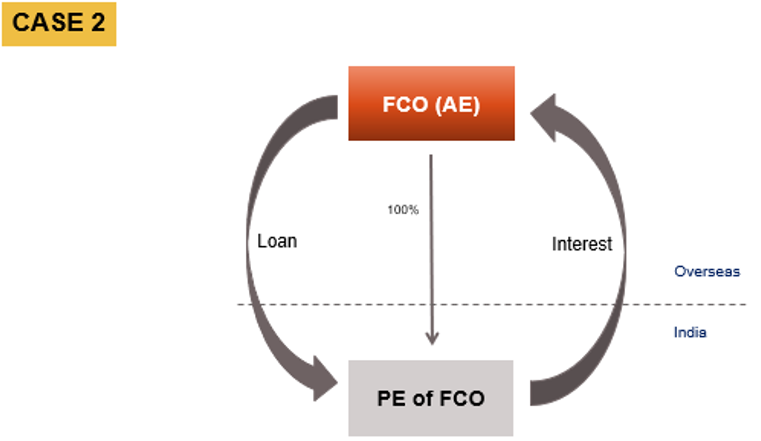
NOTE : –
AE shall have the same meaning as assigned to it in the provision of Transfer Pricing u/s 92A
CONDITIONS : –
However, the provision of this section would be applicable :
- Where interest is deductible in computing income chargeable under the head profit and gains of business and profession
- Where expenditure by way of interest or of similar nature exceeds Rs. 1 crore, in respect of any form of debt issued by a non-resident AE of such borrower.
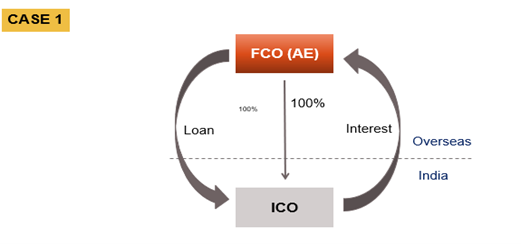
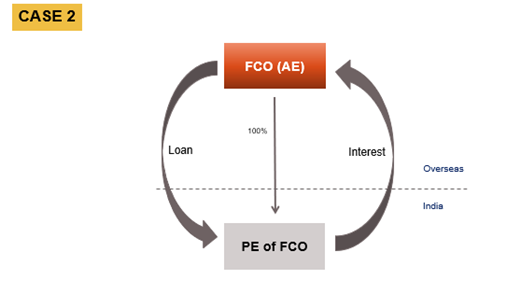
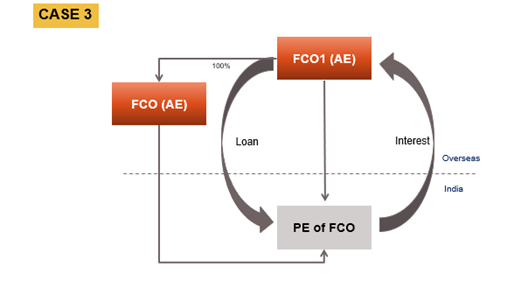
EXAMPLE : –
ICO has taken External Commercial Borrowing of Rs. 20 cr. from its foreign parent and paid interest of Rs. 1.5 cr. (5 % p.a.). Whether such interest payment would attract disallowance under section 94B ?
SOLUTION : –
Provision of section 94B would be applicable where expenditure by way of interest or of similar nature exceeds Rs. 1 crore, in respect of any form of debt issued by a non-resident AE of such borrower. In this case provision of section 94B would be attracted as the amount of interest payment to foreign AE exceeds Rs. 1 cr.
MEANING OF DEBT – SECTION 94B
Debt means –
Any loan, financial instrument, finance lease, financial derivative, or
any arrangement that gives rise to interest,
discounts or other finance charges
that are deductible in the computation of income
chargeable under the head “Profits and gains of business or profession”.
INTEREST EXPENSE INCURRED FOR AE AND NON-AE – SECTION 94B
EXAMPLE 1 : –
| Particulars | Amount (in crores) |
| EBITDA of ICO (Borrower) | 200 |
| 30% of EBITDA | 60 |
| Interest paid to foreign AE | 10 |
| Interest paid to non-AE | 70 |
| Total interest expense | 80 |
| Total interest in excess of 30% of EBITDA (80-60) (A) | 20 |
| Interest paid to AE (B) | 10 |
| Lower of A and B | 10 |
| Interest to be disallowed u/s 94B | 10 |
INTEREST EXPENSE INCURRED ONLY FOR AE – SECTION 94B
EXAMPLE 2 : –
| Particulars | Amount (in crores) |
| EBITDA of ICO (Borrower) | 200 |
| 30% of EBITDA | 60 |
| Interest paid to foreign AE | 80 |
| Interest paid to non-AE | 0 |
| Total interest expense | 80 |
| Total interest in excess of 30% of EBITDA (80-60) (A) | 20 |
| Interest paid to AE (B) | 80 |
| Lower of A and B | 20 |
| Interest to be disallowed u/s 94B | 20 |
INTEREST EXPENSE INCURRED ONLY FOR NON AE – SECTION 94B
EXAMPLE 3 : –
| Particulars | Amount (in crores) |
| EBITDA of ICO (Borrower) | 200 |
| 30% of EBITDA | 60 |
| Interest paid to foreign AE | 0 |
| Interest paid to non-AE | 90 |
| Total interest expense | 90 |
| Total interest in excess of 30% of EBITDA (90-60) (A) | 30 |
| Interest paid to AE (B) | 0 |
| Lower of A and B | 0 |
| Interest to be disallowed u/s 94B | 0 |
DEBT DEEMED TO BE ISSUED BY AE – SECTION 94B
Where the debt is issued by a lender which is not AE but an associated enterprise either : –
- provides an implicit or explicit guarantee to such lender or
- deposits a corresponding and matching amount of funds with the lender, such debt shall be deemed to have been issued by an associated enterprise.


Facts :
- FCO 1 owns 100% shareholding in ICO
- Lender provides loan of Rs. 20 cr.to ICO.
- FCO 1 provides guarantee in respect of loan given by Lender to ICO
- ICO paid interest to Lender of Rs. 2 cr.
Issue :
- Whether interest paid by ICO to Lender would attract disallowance u/s 94B ?

Facts :
- FCO 1 owns 100% shareholding in ICO
- Lender provides loan of Rs. 20 cr.to ICO.
- FCO 1 deposits amount of Rs. 20 cr. With Lender in respect of loan given to ICO.
- ICO paid interest to Lender of Rs. 2 cr.
Issue :
- Whether interest paid by ICO to Lender would attract disallowance u/s 94B ?
EXEMPTION FROM APPLICABILITY OF SECTION 94B
Provision of section 94B shall not be applicable to an Indian company or permanent establishment of a foreign company which is engaged in the business of banking or Insurance
AVOIDANCE OF INCOME TAX BY TRANSFER OF INCOME TO NON RESIDENT – SECTION 93
Section 93 covers transactions which are designed to avoid tax liability by way of transfer of asset to non resident persons. This section also covers variety of transactions where assets are transferred to non resident person and the transferor indirectly derives income under the guise of obtaining loans or repayment of loans.

AVOIDANCE OF INCOME TAX BY TRANSFER OF INCOME TO NON RESIDENT – SECTION 93
As per the provisions of section 93(1)(a) income from the transferred asset would be deemed as the income of the transferor, where the following conditions are satisfied : –
- There is a transfer of assets (whether movable or immovable and whether tangible or intangible) to non resident person;
- due to such transfer the income from such assets become payable to non resident;
- transferor acquires power to enjoy the income whether immediately or in future;
- transfer is made by any person in India or outside irrespective of his residential status or citizenship;
- transfer is made either alone or in connection with associated operations;
- the assets transferred directly yield income chargeable to tax (i.e. income should not be exempt from income tax) under this Act.
Section 93(1)(a) is attracted where transferor has power to enjoy income from the transferred assets. However 93(1)(b) is applicable where the transferor either before, or after the transfer, is entitled to receive any capital sum. The payment of which is connected with transferor or any associated operations thus in such case also income of the non resident from the transferred asset would be deemed as income of the transferor.
Capital sum means
- Any sum paid or payable by way of loan or repayment of loan;
- And any other sum paid/ payable otherwise then as income, being a sum which is not payable for full consideration in money or money’s worth.
POWER TO ENJOY THE INCOME OF NON RESIDENT
A person shall be deemed to have power to enjoy the income of non resident person if
- The income is in fact, so dealt with by any person as to be calculated at some point of time to enure for the benefit of the transferor (whether in the form of income or not).
- the receipt or accrual of the income operates to increase the value of any assets held by transferor or for his benefit;
- transferor receives or is entitled to receive at any time any benefit out of that income or out of monies which are or will be available for the purpose due to effects of the associated operations on that income and the assets which represent that income;
- transferor has power to obtain for himself, whether with or without the consent of other person, the beneficial enjoyment of the income (by means of exercising any power of appointment or power of revocation or otherwise),
- Transferor has the direct or indirect power to control the application of income
ASSOCIATED OPERATIONS
Associated operations in relation to any transfer means an operation of any kind affected by any person in relation to –
- any of the assets transferred, or
- Any assets representing, whether directly or indirectly any of the assets transferred;
- The income arising from any such assets or
- any assets representing, whether directly or indirectly, the accumulation of income arising from such assets.
SUBSEQUENT RECEIPT OF DEEMED INCOME – SECTION 93
Where any income of non resident has been deemed as income of transferor under the provisions of section 93, and that income has been subsequently received then it shall not be deemed to form part of his income for the purpose of Section 93.
NON APPLICABILITY OF SECTION 93 IN BONA-FIDE COMMERCIAL TRANSACTION
The provision of this section shall not apply if the transferor shows to the satisfaction of AO that:
- Neither the transferor nor any associated operations had the purpose of avoidance of tax liability ; or
- the transfer and all associated operations were bona-fide commercial transaction and were not designed for the purpose of Income Tax avoidance.
IMPACT OF SECTION 40(A)(I) DISALLOWANCE ON SECTION 94B
EXAMPLE 4 : –
| Particulars | Amount (in crores) |
| EBITDA of ICO (Borrower) | 100 |
| 30% of EBITDA | 30 |
| Interest paid to foreign AE 1 | 70 |
| Interest paid to foreign AE 2 | 10 |
| Total interest expense (A) | 80 |
| Disallowance under section 40(a)(i)- (B) | 10 |
| Interest deductible (A-B) | 70 |
| Total interest in excess of 30% of EBITDA (80-30) | 50 |
| Interest paid to AE | 80 |
| Lower of A and B – (C) | 50 |
| Disallowance u/s 94B (50-10) – (C – B) | 40 |
NOTE : –
Provision of section 94B would be applicable where interest is deductible in computing income chargeable under the head profit and gains of business and profession. In example 4 interest paid to AE 2 of Rs. 10 crore is not deductible due to disallowance under section 40(a)(i). Accordingly such interest of Rs. 10 crore should not be consider for disallowance under section 94B.
For any queries, please write them in the Comment Section or Talk to our tax expert



